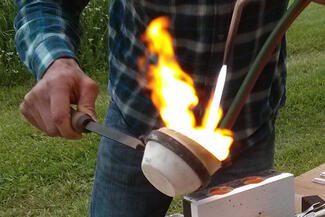Creative Casting Techniques
This course is an exploration of direct casting techniques which utilize both ancient and contemporary materials and equipment. These processes give makers the opportunity to rapidly translate an idea into a metal object, using the bare minimum of specialized equipment and facilities.
Students will experiment with a number of different methods that may be repeated with relative ease in their own studios, including open face press casting, cuttlebone, tufa stone, oiled sand (cope and drag), and loose sand (Styrofoam replacement). Participants will leave with samples from each different casting method. Those who come prepared with ideas for a specific design may likely leave with a finished piece. This course is designed to give every metalsmith more options for producing their work, regardless of skill level.
Meet the instructor

Peter Evonuk is a farm boy, door-to-door vacuum cleaner salesman, appliance delivery dude, construction worker, roofer, metalsmith, sculptor, art instructor, and social satirist from the island of Maui. Peter received his BFA in Sculpture/Metalsmithing and jewelry from the University of Oregon and his MFA in Metalsmithing from the Cranbrook Academy of Art. He serves as an instructor and studio manager for the Jewelry and Metalsmithing department at the Massachusetts College of Art and Design. Peter’s work explores human ingenuity and discovery through the redesign and subversion of the ubiquitous utilitarian device. Chairs, lamps mouse traps and teapots, all products produced to address the most basic needs of society, are hijacked, dissected and used as compositional framework for polemic objects.
Materials & Tools
There is s $50 materials fee for this course, which is payable upon registration. This fee supplies students with 1 oz of sterling silver casting grain, the use of bronze casting grain for the rest of their samples, cuttlefish bone, casting sand, and other various supplies necessary for completing the processes covered in the workshop.
- A notebook
- Ideas and designs for small pendants, buttons, simple rings, etc…
- OPTIONAL: One oz. of sterling silver, and a larger amount of bronze will be supplied to students as part of their materials fee, however if students have particular designs in mind that will require larger amounts of sterling, or if they prefer to work exclusively in sterling, they should bring their own. You can purchase sterling casting grain from Rio Grande, item # 100800

